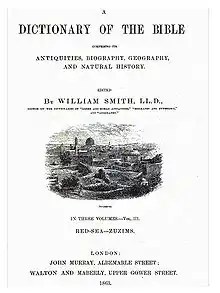
Nave's Topical Bible 1905
Names play a variety of roles in the Bible. They sometimes relate to the nominee's role in a biblical narrative, as in the case of Nabal, a foolish man whose name means "fool".[1] Names in the Bible can represent human hopes, divine revelations, or are used to illustrate prophecies.[2]
Most popular names
During the period 330 BC – 200 AD, the most common male names in Judea or post Kingdom of Israel were:[3]
- 1. Simon/Simeon
- 2. Joseph/Joses
- 3. Lazarus
- 4. Judah
- 5. John
- 6. Jesus
- 7. Ananias
- 8. Jonathan
- 9. Matthew/Matthias
- 10. Manaen
- 11. James
- 12. Michael
During this period, the most common female names were:[3]
- 1. Mary
- 2. Salome
- 3. Shelamzion
- 4. Martha
- 5-6. Joanna and Sapphira (equally common)
- 7. Berenice
- 8-9. Imma and Mara (equally common)
- 10–12. Cyprus, Sarah, and Alexandra
Lists
- List of biblical names starting with A
- List of biblical names starting with B
- List of biblical names starting with C
- List of biblical names starting with D
- List of biblical names starting with E
- List of biblical names starting with F
- List of biblical names starting with G
- List of biblical names starting with H
- List of biblical names starting with I
- List of biblical names starting with J
- List of biblical names starting with K
- List of biblical names starting with L
- List of biblical names starting with M
- List of biblical names starting with N
- List of biblical names starting with O
- List of biblical names starting with P
- List of biblical names starting with Q
- List of biblical names starting with R
- List of biblical names starting with S
- List of biblical names starting with T
- List of biblical names starting with U
- List of biblical names starting with V
- List of biblical names starting with Y
- List of biblical names starting with Z
See also
- Gemstones in the Bible
- Genealogies in the Bible
- List of major biblical figures
- List of minor Old Testament figures, A–K
- List of minor Old Testament figures, L–Z
- List of minor New Testament figures
- List of biblical places
- List of animals in the Bible
- List of plants in the Bible
- List of women in the Bible
- List of names for the biblical nameless
- List of modern names for biblical place names
- Young's Analytical Concordance to the Bible – for which later editions contain A complete list of Scripture Proper Names as in the Authorised and Revised Versions, showing their modern pronunciation and the exact form of the original Hebrew by Wm. B. Stevenson.
- Theophory
- Bible names in their native languages
References
- ↑ See 1 Samuel 25:25
- ↑ Lockyer, pp. 11-14
- 1 2 Bauckham, Richard (2017). "Palestinian Jewish Names". Jesus and the Eyewitnesses: The Gospels as Eyewitness Testimony (2nd ed.). Grand Rapids: Eerdmans. pp. 67–92. ISBN 978-0-8028-7431-3.
Further reading
- Comay, Joan, Who's Who in the Old Testament, Oxford University Press, 1971, ISBN 0-19-521029-8
- Elwell, Walter A., Evangelical Dictionary of Theology, Baker Publishing Group, 1984, ISB 9781441200303
- Lockyer, Herbert, All the men of the Bible, Zondervan Publishing House (Grand Rapids, Michigan), 1958
- Lockyer, Herbert, All the women of the Bible, Zondervan Publishing 1988, ISBN 0-310-28151-2
- Lockyer, Herbert, All the Divine Names and Titles in the Bible, Zondervan Publishing 1988, ISBN 0-310-28041-9
- Tischler, Nancy M., All things in the Bible: an encyclopedia of the biblical world , Greenwood Publishing, Westport, Conn. : 2006 ISBN 0-313-33082-4
External links
Wikiquote has quotations related to List of biblical names.
Wikimedia Commons has media related to List of biblical names.
- Nave's Topical Bible
- Smith's Bible Dictionary
- Easton's Bible Dictionary
- Catholic Encyclopedia 1917
- New Schaff-Herzog Encyclopedia of Religious Knowledge (Dictionary edition)
This article is issued from Wikipedia. The text is licensed under Creative Commons - Attribution - Sharealike. Additional terms may apply for the media files.

